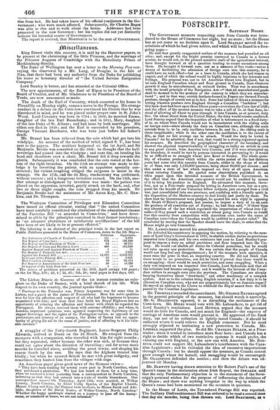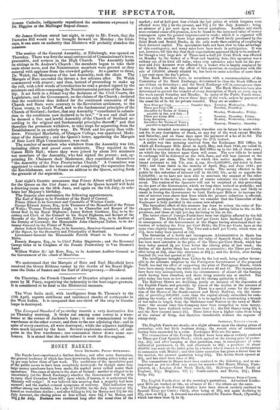POSTSCRIPT.
SATURDAY NIGHT.
The Government measure respecting corn from Canada was intro- duced to the House of Commons last night, but no more ; for the House has as yet come to no decision upon it. Lord STANLEY moved the re- solutions of which he had given notice, and which will be found in a fore- going page—
He said that greatly exaggerated notices of the measure had prevailed on all sides; and, except for the bright promise conveyed to Canada in a former session, he would not, in the present sensitive state of the agricultural interest, have brought forward at all a question tending to create uneasiness among
them. He brought it forward now, not as a asure of free trade—not as a means of facilitating the admission of foreign corn into this country, for it could have no such effect—but as a boon to Canada, which she had reason to expect, and of which the refusal would be highly injurious to her interests and feelings. His proposal was, not to let American wheat into England, but to let into England Canadian wheat and flour ground in Canada, from whatever growth it may be manufactured, at reduced duties. That was in accordance with the broad principle of the Navigation Act that all manufactured goods shall be deemed to be the produce of the country in which they are manufac- tured "; and in that way, ostrich feathers dressed in France are deemed French produce, though of course not so in fact. Some had talked of this as a measure for letting wheaten produce into England through a Canadian "backdoor "; but this back-door had been open these fifteen years—ever since the Corn-law of 1828; and the effect of the present measure was to take a toll of 3s. at that door, in- stead of allowing all wheat to pass through it into Canada, as at present, duty free. On wheat direct from the United States, the duty would remain unaltered. Lord Stanley argued that the imposition of what is tantamount to a fixed duty- of 4s. on wheat from Canada would not be inconsistent with the sliding scale on foreign corn—since already the duty on Canadian corn, although the scale extends from Is. to 5s. only oscillates between 2s. and Sc.; the eliding scale is there inapplicable; while in the other case the oscillation is to the extent of 20s.' so that no fair average can be struck. 'Would the duty be levied in Canada2 for he admitted, that if not, that would be a strong argument against his measure. Be described the geographical character of the boundary, and showed the physical impracticability of smuggling so bulky an article as corn to any great extent, from America into Canada; and if it were attempted on the boundary, it would be met by persons interested in preventing it: it would be as difficult as to smuggle wheat into Kent or Sussex. The whole quan- tity of wheaten produce which within the entire period of the last thirteen years had come into this country from Canada, either in the shape of wheat or of flour, was only 1,153,000 quarters, being about 90,000 per annum ; and this under a state of law which imposed no duty at all upon Ammican wheat entering Canada. He quoted some observations published in an Ohio paper upon this intended measure of the British Government, to the effect that the American corn-grower would not be enabled by means of it to bring his produce to England. He advocated this measure, there- fore, not as a Free-trade proposal for letting in American corn, but as a pro- posal for the benefit of our Canadian fellow subjects, just emerged from a civil war, just consolidated into one province, and confiding with a friendly spirit in the disposition of the Mother-country to deal kindly and justly by. them. To show how far Government were pledged, he quoted his own reply m opposing Mr. Smith O'Brien's proposal, last session, to impose a duty 4 Is..on corn the produce of all countries out of Europe: he bad then said, "If there went any alteration of the law which regulated the importation of wheat into Cal- nada—if they passed such a restriction on wheat going into Canada as would free this country from competition with American corn under the name of Canadian corn—then the Canadian would be entitled to a greater relief." He concluded by moving that the Speaker should leave the chair, in order that the House might go into Committee.
Mr. LABOUCHERE moved his amendment—
He defended his consistency in opposing the motion, by referring to the mea- sure of Lord Grey's Government in 1831, to abolish certain duties on provisions imported into Canada, and his own resistance last year to Lord Stanley's pro- posal to impose a duty on salted provisions and flour imported into the Co- lony. He would not abolish all duties for Colonial protection, but he would not raise up any new protection. He was certain that the people of Canada would not long feel any disappointment ; for if the measure were operative, it must raise the price in that, an importing country. He did not think that there would be no protection, nor did he think it proved that there would be no smuggling: there would be much protection and some smuggling. When a duty was imposed on tea imported into Canada, Lord Sydenham said that all the colonists had become smugglers; and it would be the interest of the Cana- dian millers to smuggle corn into the province. The Canadians are already busying themselves about " drawbacks " and other machinery of a complex
system. And as to the colonies being English counties, if a low duty is to be allowed on Canadian corn, why not one proportionately low on Jamaica sugar 2 Be moved an address to the Crown to withhold the Royal assent from the bill passed by the Canadian Legislature.
Mr. THORNELY seconded the amendment. Mr. GEORGE BANES agreed in the general principle of the measure, but should watch it narrowly,
Mr. G. HEATHCOTE opposed, it as disturbing the settlement of the Corn-laws. Mr. Mies would vote with gr. Labouchere, to get rid of Lord Stanley's resolutions. Lord HOWICK argued that the measure would do little for Canada, and not much for England—the expense of carriage of American corn would prevent it. He approved of the fixed duty, but not of its collection in lightly-taxed Canada : it should be collected where it could relieve the English consumer. But be most strongly objected to instituting a new protection in Canada. Mr. LIDDELL supported the plan. So did Mr. CHARLES BULLER, as a Free. trader ; since it tended to introduce more flour here : and Canada has right to decide which of two restrictive systems it would prefer, the existing one with England, or the new one with America. Mr. ROE- BUCK could not support Mr. Labouchere's interference with the Cana- dian Legislature ; and he ridiculed the idea of excessive importations through Canada : but he should oppose the measure, as Canada cannot grow enough wheat for herself, and smuggling would be encouraged. Mr. GLADSTONE defended the motion ; and then the debate was ad- journed till Monday.
Mr. Bnewir-r having drawn attention to Sir Robert Peel's use of the Queen's name in the declaration about Irish Repeal, the SPEAKER said that the only Parliamentary objection is to the statement of the Sove- reign's personal wishes for the purpose of influencing the decisions of the House ; and there was nothing irregular in the way in which the Queen's name had been mentioned on the occasion in question.
In the House of Lords, the Townshend Peerage Bill was reported. The Sudbury Disfranchisement Bill was ordered to be read a second time that day six months, being thus throve out. Lord BEAUMONT, RS a
Roman Catholic, indignantly repudiated the sentiments expressed by Dr. Higgins at the MuBinger Repeal dinner.



























 Previous page
Previous page